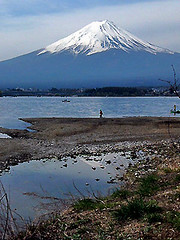October 10, 2010
What Makes a Mountain a Deity?
 Mt. Fuji: April 11, 2004
Originally uploaded by derochan3
Mt. Fuji: April 11, 2004
Originally uploaded by derochan3 |
How do mountains get to become "Kami"? According to Motoori Norinaga's famoust definition of kami, they are "What ever seemed strikingly impressive, possessed the quality of excellence and virtue, and inspired a feeling of awe was called Kami".
Thus in Japan outstanding features of the natural landscape - such as mount Fuji - as well as warriors, weapons, rulers, and sumo wrestlers are regarded as kami, since they all inspire awe.
It is tempting to suggest that it is not the human perception "that is strikingingly impressive" or "that is awe-inspiring" is an effect rather than a cause of supernaturality. Not so fast. Another definition of kami, from the record of sayings of shinto, states "Kami are not precious in themselves, but are prescious as a result of being respected by humans." The chief priest of Koura Shrine went to far as to say, "Kami are notjust a given. We have to work [their creation] through the process of enshrining them." Sometimes the magic works, and people feel awe when they look at Mount Fuji. Other times, even if it does not work, Shinto encourages them to keep trying: to climb mount Fuji again, or pray to the giant tree at the top of a mountain, or to wrap a rope made of rice straw around the giant rock, and often the magic returns. We feel awe again.
But what is the big deal? Why should inspiring awe make a thing supernatural? On the basis of this arguement, every quack-pot, primitive, superstision, every new religious fad, every cruel or violent cult would, if the believers "feel awe," be entitled to claim that the object of their religion is in some sense supernatural or at least a kami. I think that the Shinto answer would be yes, they all are.
My own explanation as to why being "striking" or "awe-inspiring" should make something supernatural derives from my understanding of Buddhism or perhaps simply humility.
Buddhism teaches us that the world is in a sense a fantasy. We are used to a world of objects and dimensions. Of things and events like keyboards, shoes, yesterday and the three dimensions of space. Buddhism argues that all these things are human interpretations, of the true unfathomable nature of things. Instead of climbing mountains, buddhist often take are more direct approach, trying to to tun off their intepretive mind, but chanting, or counting their breath and trying to think of nothing.
I don't think that it is necessary to believe in Buddhism to realise the conditioned nature of the world. All one really needs to be is humble. We now know that humans have basically the same structure as earth worms. We share most of our genes with dogs. But at the same time we do not presume that worms or dogs know much about the world. Worms have a wormy world view and dogs have a doggy one. The human interpretation of the world as made up of three dimensions, plus time, and populated with things, is about as close to the truth of universe as that of the worm.
So here comes Mount Fuji. In my experience, nature, like works of art has the effect of preventing human interpretation. There is that "Mount Fuji whammy", the size, the feeling of awe takes ones breath, and more importantly ones interpretive mind, away. Mount Fuji seems to have the ability to do inspire awe in a large number of people. It is I believe Mount Fuji's ability to bring us back to our humility and the unfathomable nature of things is why it gets to be a Kami.
Posted by timtak at October 10, 2010 05:43 PM